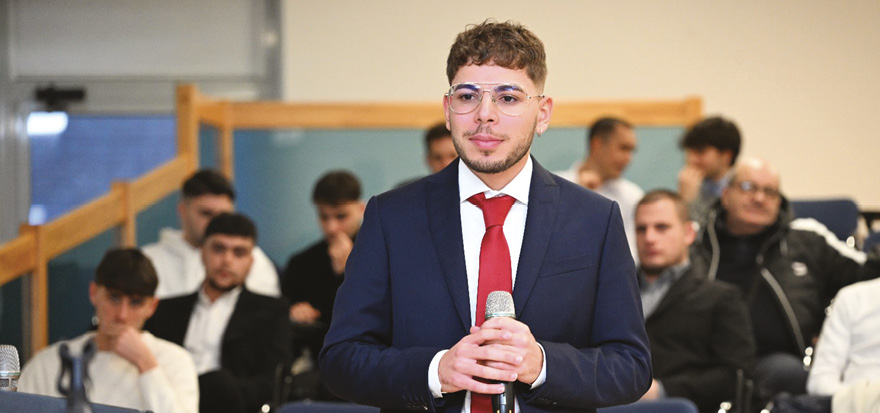Gabriele Cammalleri, twenty-two years old, visually-impaired, with a recent degree in Agricultural Science, is one of the participants in “Volare oltre la vista, destinazione inclusione” / “Flying beyond sight, destination: inclusion” sponsored by Swissport Italia, the leader in airport handling services, and by UICI (Unione Italiana Ciechi e Ipovedenti / The Italian Union of the Blind and Partially Sighted). The project promotes the inclusion of visually-impaired people in passenger ground service jobs. After completing a training period, since September Gabriele and the other participants have been working at Fiumicino. He’s eager to tell us about his first months on the job.
You’ve changed everything: home, city, job. How did it go?
It was a really big change, but luckily I’m young and at my age it’s a little simpler to turn your life upside down. It wasn’t easy, but I’m slowly regaining my balance.
The hard parts?
I come from a university environment where I was in contact with people of my age and with similar needs. Working with people who are older and who have a variety of needs makes it harder to develop the relationship outside the work environment. In addition, my housing situation isn’t great, and even though it’s close to the airport the connections to work and to Rome are definitely insufficient. But they’re all part of the journey, and the desire to continue this experience helps me live with them and overcome them.
And the good things?
Being in contact with older people lets me look at things from a different viewpoint. Plus, I’ve been very lucky to meet people who are always willing to help. This job makes me a reference point for passengers who have problems. Having a disability means you need the help of others, so being able to help other people in need is especially gratifying.
All day at the airport, but where would you like to travel?
I’m working on it. I’ve wanted to visit London for a long time. I’d also love to travel around Japan.
This initiative is designed to make society more inclusive. Do you think this is possible? Any suggestions?
We’ve certainly come a long way in terms of inclusion, but there’s still a lot left to do. With regard to jobs, I hope this project can be an inspiration for many other companies and that similar projects don’t become topics for media coverage, but instead the norm. One piece of advice I’d like to offer companies is to give their employees a chance to express their needs, because very often the changes to be adopted are simpler than you might expect. To other young people: have the courage to leave your comfort zone, that’s the only way to achieve self-sufficiency.





.png)